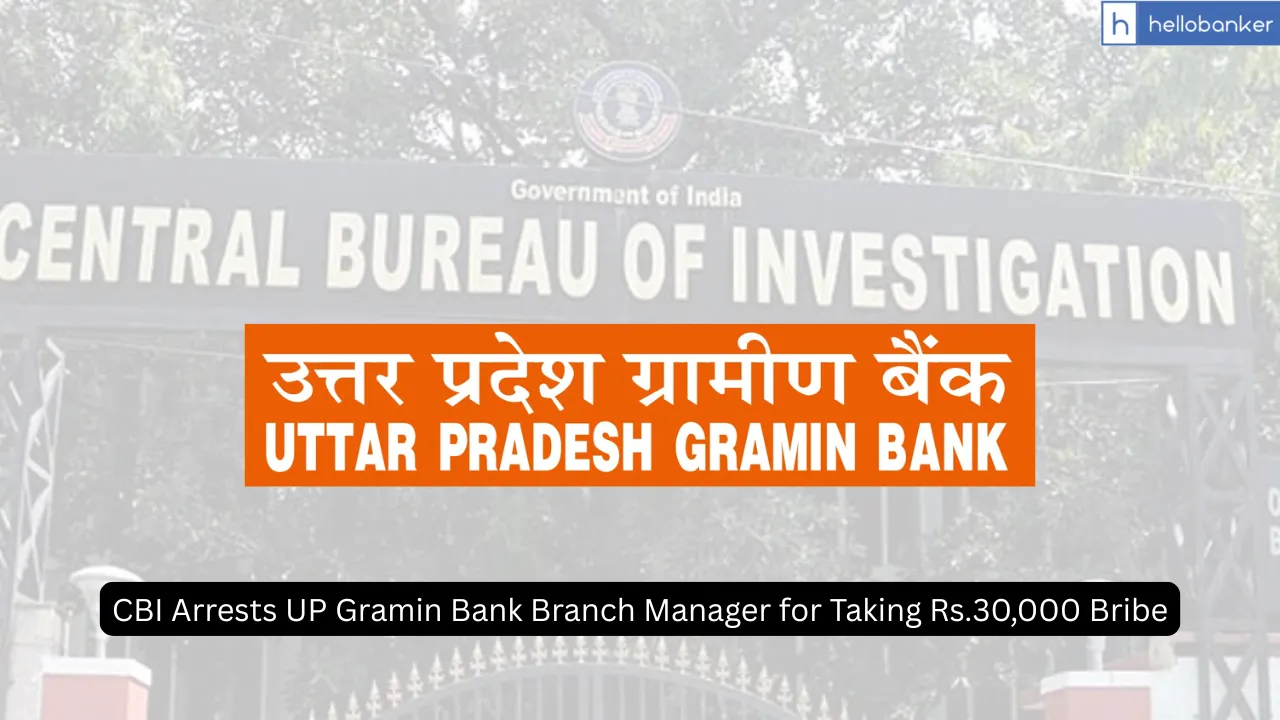Farrukhabad: In a troubling case of corruption within the banking sector, the Central Bureau of Investigation (CBI) has arrested the Branch Manager of UP Gramin Bank’s Sankisha branch and a private individual for allegedly accepting a bribe of ₹30,000 from a farmer. The case highlights the ongoing issue of bribery in loan disbursements, prompting a deeper investigation by the CBI.
- Corruption in Indian Banking: A Case Study
- Ongoing Investigations and Consequences
- Bribery in India’s Banking Sector: The Bigger Picture
- Key Statistics on Corruption in India
- Looking Ahead: Solutions to Combat Corruption
- Bankerpedia’s Insight 💡
- How Does This Affect the Banking Ecosystem? 🏦
- Research References 📚
- Loved our Research? ❤️
Corruption in Indian Banking: A Case Study
The Indian banking system is facing scrutiny as incidents of bribery continue to surface, undermining public trust. In a recent incident in Farrukhabad, a farmer applied to increase his Kisan Credit Card (KCC) loan limit from ₹2.4 lakh to ₹6 lakh, only to be met with a demand for a bribe of ₹30,000 from the Branch Manager of UP Gramin Bank. The farmer’s situation reflects the struggles many face when navigating official procedures that should be straightforward.
The farmer, seeking a legitimate enhancement of his loan limit, initially resisted the demand for a bribe and hoped the process could occur without illicit dealings. After repeated insistence from the Branch Manager, he decided to take action by filing a complaint with the CBI. On September 9, 2025, the agency registered the case, and through a swift operation, apprehended both the Branch Manager and a middleman red-handed while accepting the bribe the following day.
Ongoing Investigations and Consequences
Both accused individuals are scheduled to appear before a competent court on September 11, 2025. With investigations into this matter still ongoing, the CBI is likely to delve deeper into other potential cases of corruption within the banking sector. Such actions aim not only to penalize those involved but also to send a clear message against corruption, which plagues numerous sectors in India.
The issue doesn’t stop with this single incident. Just days before, the CBI arrested another Branch Manager and Field Officer of UP Gramin Bank in Chandausi for similar allegations. In that case, they demanded ₹35,000 to release the remaining balance of a loan for a garment manufacturing unit, showcasing a pattern of unethical behavior within the institution.
Bribery in India’s Banking Sector: The Bigger Picture
The prevalence of bribery in the Indian banking sector not only affects farmers and small business owners but also runs the risk of hindering the overall growth of the economy. When loans that could potentially uplift individuals are withheld due to corrupt practices, the ripple effect can lead to stalled businesses and wasted opportunities.
For example, consider how a farmer denied access to necessary funds may struggle to buy seeds and fertilizers, directly impacting crop yield. Similarly, a young entrepreneur, like the sister of the previous victim, may find their dream of starting a business curtailed, affecting not only their livelihood but also contributing to higher unemployment rates.
This scenario reinforces the need for stringent enforcement of anti-corruption laws and policies to foster a banking environment built on integrity and accountability.
Key Statistics on Corruption in India
The following table summarizes key statistics regarding corruption and bribery cases reported in India over the past year, illustrating the severity of the issue:
| Year | Total Bribery Cases | Banking Sector Cases | Cases Resolved | Notable Arrests |
|---|---|---|---|---|
| 2022 | 2,130 | 375 | 1,875 | 150 |
| 2023 (to date) | 1,450 | 210 | 900 | 75 |
Looking Ahead: Solutions to Combat Corruption
As the CBI press charges and conducts investigations, it is crucial for policymakers and banking officials to implement changes that discourage corruption. One significant step would be to enhance transparency in loan processes and involve technology to monitor transactions more effectively. For instance, using blockchain technology could assure a level of trust in transactions, reducing the need for bribes.
Moreover, financial literacy programs targeting potential borrowers will empower them to navigate loans successfully, increasing awareness of their rights. Reports also suggest that implementing stringent audits and establishing whistleblower protection can help in curbing such illegal practices.
In conclusion, while the recent arrests highlight a concerning trend within the banking sector, they also open the door for essential reforms that can ultimately benefit the Indian economy. By addressing corruption comprehensively, India can build a more robust and trustworthy financial system for all citizens.
Bankerpedia’s Insight 💡
The recent arrest of a bank manager for demanding bribes illustrates the pervasive corruption undermining India’s banking sector. This incident not only erodes public trust in financial institutions but also hampers farmers’ access to essential credit, negatively impacting agricultural growth and livelihoods. As the CBI actively pursues such cases, it’s essential for citizens to report any corrupt practices they encounter. Strengthening accountability within banks can foster a more transparent environment, encouraging fair financial support to those who need it most, particularly in rural areas.
How Does This Affect the Banking Ecosystem? 🏦
- Bank Employees → Increased scrutiny and pressure on bank employees’ ethics.
- Bank Management → Increased scrutiny and potential regulatory reforms for banks.
- Bank Customers → Increased distrust and anxiety among bank customers.
- Investors / Shareholders → Increased regulatory scrutiny may impact bank profitability negatively.
- Regulators (RBI, SEBI, Govt.) → Increased scrutiny on financial institutions and corruption control.
- General Public → Increased awareness of banking corruption and unethical practices.
Research References 📚
Loved our Research? ❤️
Bankerpedia turns financial confusion into clarity!
Subscribe to our YouTube channel for unbiased insights, financial literacy & practical banking wisdom.










